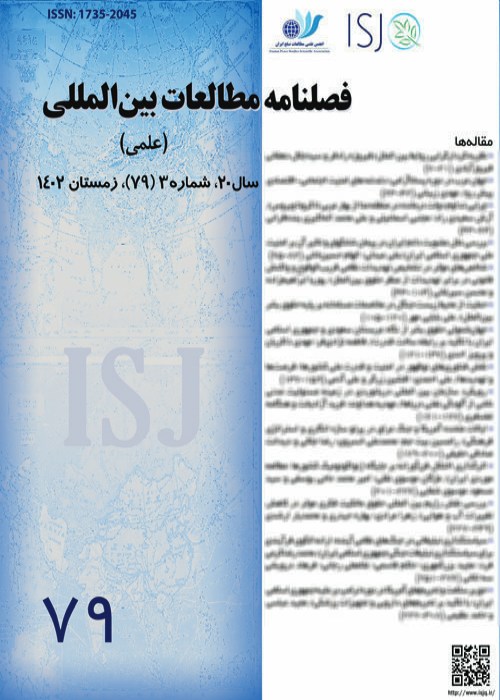فهرست مطالب
نشریه مطالعات بین المللی
سال پنجم شماره 1 (پیاپی 17، تابستان 1387)
- تاریخ انتشار: 1387/04/19
- تعداد عناوین: 5
-
-
Page 1The collapse of the bipolar world and the end of the Cold War has brought about new challenges، which require a revitalization of international law. The existing system of maintenance of international peace and security، allows appropriate organs other than the UN SC، to play a role. Arguably، prosecution of serious international crimes is a function more appropriate for a judicial organ. However، the UN SC may find that doing justice would otherwise jeopardize efforts to achieve peace through other means، such as truth and reconciliation commissions or amnesties. This political discretion is now given to the independent Prosecutor under the ICC Statute and it is unclear whether the ICC model is complementary or concurrent with the UN system. The ICC model binds non state parties. However the jus cogens justification refers to the prohibitions and not the jurisdiction of the court. Absent universal endorsement of the ICC model، the presumption of consent binds non state parties. In terms of efficiency one should consider establishing similar regional institutions، based on subsidiarity principles. The establishment of regional criminal courts closer to the place of events، victims and witnesses might represent a useful complement to the ICC in the combat against impunity.
-
Page 77Bangladesh has a colonial historical background and achieved her independence in 1971. In recent years، the trafficking of women and children has acquired a global dimension by the UN; but for South Asian countries، the issue is already considered a serious regional problem، which demands a concerted response to this issue. However، the problems of trafficking women and children seem to have increased tremendously in the last two decades، especially in Bangladesh. The huge profit reaped by the perpetrators، increasingly linked to organized crime has turned this trade into a rapidly growing menace. It should be mentioned that poor women and children are the targets of traffickers، because of the magnetization of extreme poverty and limited access to economic resources. Trafficking is a violation of human rights، which has various consequences at the individual، family، community، and country levels، so it is a form of exploitation of the weaker members of the society. Hopefully، this study will be helpful to policymakers and bodies concerned with how to reduce human trafficking and identifying pitfalls in this regard in Bangladesh.
-
Page 91The strong motivation driving talented and smart people to escape from their own country could include the lack of social support، realizing their ambitions and job opportunities in their country. The results of a research project done by the Ministry of Science، Research and Technology of Iran shows that this “brain drain” is a consequence of the disruption caused by: diminished hope for the future; an increased sense of social، cultural and political insecurity; lack of attention by the government policies to the issue of competence and unemployment; continuous crises; sudden changes in laws and regulations; and also economic، cultural and scientific problems. Over the last 30 years، Iranian society has suffered a continuous brain drain which is PARTLY A reaction to political challenges; the ways of allocating funds to research projects; and the lack of optimal investment in research and development could be some of the examples of massive economic mismanagement of the government of Iran which has played a role in the brain drain.
-
Page 145The forthcoming US presidential election is one of the most hotly contested elections in American history and has reversed the key indicators for correctly predicting a winner. Currently، there seems some chance that the first female president could be nominated and، with her husband as a former president at her side، gender has become an important issue. Also، the fact that a black president is a real possibility in 2008، and oftentimes a difficult subject to talk about، reveals how discussing some of the historical aspects of how black people entered the U. S. is a source of tension as the election approaches. The debate about race politics encourages us to expand our ways of thinking and accept the potential for changes in the models of predicting elections.
-
Page 171The ad-hoc committee for the elaboration of the UN Convention against Corruption after two years of negotiation (from January 2002 until October 2003) concluded its work and the draft convention was finally approved by the General Assembly on 31 October 2003 and opened for signature at the High Level Conference in Merida، Mexico، in December 2003. The UN Convention against Corruption (UNCAC) is the first legally binding international instrument to help countries fight corruption both in public and private sectors and entered into force on 14 December 2005. As stipulated in Article 1 of the UNCAC، the purpose of this convention is to prevent and combat corruption more efficiently and effectively، to promote and facilitate international cooperation and technical assistance and to promote integrity، accountability and proper management of public affairs and public property. The Convention is based on its four important pillars which are: 1) Prevention، 2) Criminalization، 3) International Cooperation، and 4) Asset Recovery; and the effective implementation of the Convention depends on the effective implementation of its pillars. The UN Convention against Corruption، as the first legally binding international instrument to combat this menace، provides appropriate measures for extradition، mutual legal assistance، and recovery and return of illicitly acquired assets to the countries of origin. The proper implementation of these measures will help the international community to achieve successful results in preventing and combating corruption.


